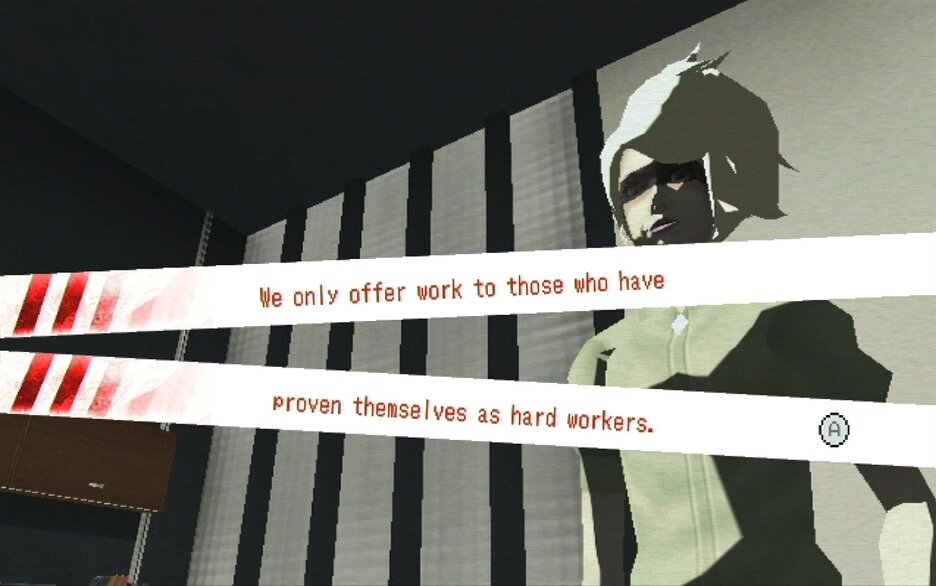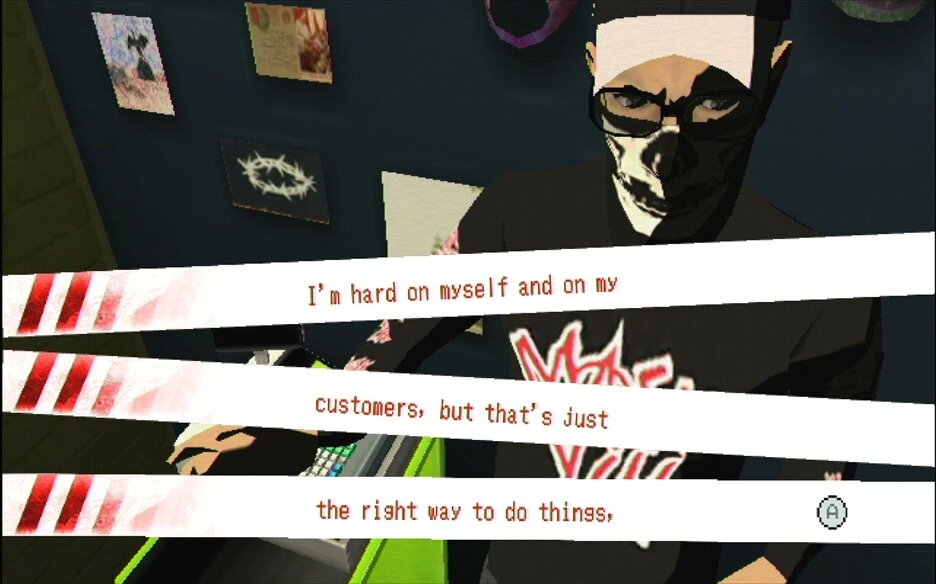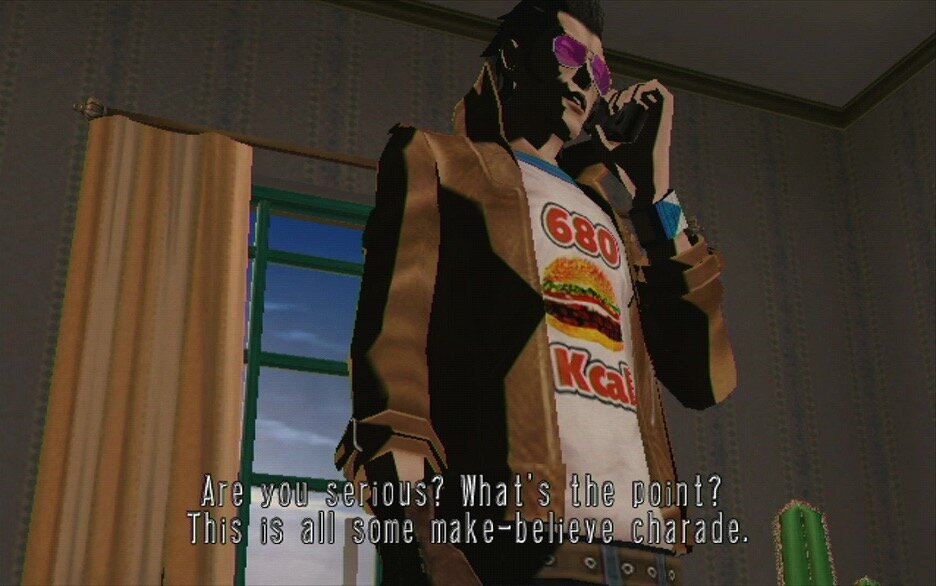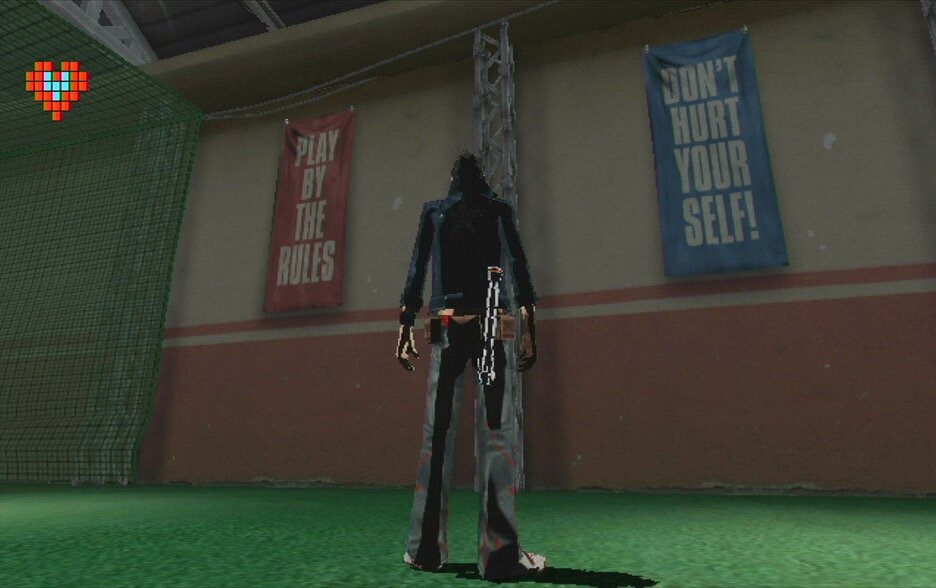Whatever Happened: No More Heroes
Travis Touchdown, Santa Destroy, and the Garden of Madness
Content Warning: Discussions of mental illness and intrusive thoughts.
By: Jake Spencer
“How much did you pay for this game?” one of my roommates asks. All three of them have gathered behind the spine-mangling futon where I’m sitting, pulled into my shared bedroom by the cacophony of obscenities and jangly slot-machine sound effects emanating from my tiny, second-hand TV.
No More Heroes, Images courtesy of the author
“Uhhh, $50,” I tell him, jerking my arm to the side. Time dilates as I land a clean slice through my victim’s neck, then speeds up again in a celebration of violence, his head popping off like a champagne cork. I am showered in blood and coins. Before the remainder of his corpse has finished falling to the floor, I split his friend bilaterally.
“That wasn’t enough,” my roommate says. “You should have paid a lot more for this.”
I was much too poor to buy full-priced games in January of 2008, but I made an exception for No More Heroes. I was a college freshman for the third time. In another life, I’d hopped on a plane right after my high school graduation and gone on to a perfect university experience in Australia’s most beautiful coastal paradise. In reality, though, I got a phone call just as I’d begun packing my bags. There’d been a miscalculation. What I thought was the cost of one year’s tuition (an amount I could just barely cover) was actually the cost of one semester.
There was nothing more to it than that. No money? No escape.
My friends and I accepted our diplomas. They raced out of our unremarkable Texas suburb without looking back. I barely left my bedroom.
I got a crummy retail job. I threw together an application and quickly got accepted to a crummy local school. I hated it. I finished the semester, and then I applied to another school that wasn’t any better, but at least it was cheaper. I hated that, too.
After burning out at two schools in as many semesters, I was directed toward a place in Washington that offered majors related to video game development (still quite rare in those days), and they didn’t have out-of-state tuition charges, so I applied. I got accepted. I flew across the country. I settled into an apartment with a few strangers. I hated every part of it, but I was too tired to do anything but get comfortable feeling miserable.
I’ve still never gotten any value out of my degree, but at least it was expensive.
“I know a lot of gamers out there don’t have much patience.”
Those are the first words spoken in No More Heroes. See, Travis Touchdown doesn’t have enough money to get what he wants at the video store because he met a woman at a bar. He bought her a drink, but then he didn’t have any money, so she offered him a job as an assassin. (How did conversation turn to assassination? It could be because he’s carrying a beam katana. What’s a beam katana? Picture a lightsaber, but instead of being made from sci-fi magic and special effects, someone clumsily tore most of the housing off of a fluorescent light fixture and soldered a battery pack to one end. Why does he have it? Look, he got it from an online auction. It doesn’t matter.) Travis took the assassination job, and apparently the guy he killed was the eleventh-ranked assassin—oh, right there’s a United Assassins Association, or UAA, that ranks professional killers—which means Travis is now only ten spots from the top.
Did you get all that? Probably not; his whole monologue is only about two minutes long.
“I wanna be number one,” he says. “How’s that? Short and simple enough for you?”
“Why are you depressed?” my friend asked. “Um, because there’s something wrong with the chemicals in my brain,” I told her.
Actually, yes. That’s much clearer. We can ignore all those other details; we’re playing a video game. Play the game. Win the game. Easy.
“Just press the A Button! Let the bloodshed begin!”
Travis slices and dices his way through each room of a stately mansion, reducing everyone who stands in his way to a cloud of gold coins and blood. Every surface is crafted from the finest marble and draped in the finest velvet. Practicality steps aside and leaves a clear path for opulence. Beds are tucked into alcoves facing a perfectly circular tub set into the floor. Tiger skin rugs are haphazardly placed wherever they’ll fit. A door opens to another hallway, another room, an outdoor pathway to another part of the estate. Each new location is showered in blood and battlecries.
No More Heroes, Screenshots courtesy of the author
Then, poof. In an instant, it’s empty. Profoundly empty.
Travis moves forward.
At last, he meets his target: Death Metal, the 10th best assassin.
Death Metal is not at all like the aggressive, screaming mooks you’ve seen so far. In fact, he seems quite serene, a glass of wine in one hand as he gazes out over his backyard pool that gazes out over a smaller pool that gazes out over the ocean. It’s a scene resembling the discomfiting beauty of a David Hockney or Hiroshi Nagai painting.
“This is Paradise,” Travis says.
Death Metal corrects him: “This is a place to die.”
“I’m glad you and I are on the same page here,” Travis agrees.
No More Heroes, Screenshot courtesy of the author
It’s 2013. I’m in a mechanic’s shop just outside of Seattle.
I’ve just been laid off from a dead-end dream job. The lease on the room I was renting will expire at the end of the week, which is just as well. I can’t stand the thought of another day in that house. I need to go down to Texas soon for my sister’s wedding, anyway. With no reason to stay where I am, I’ve gone online and bought a car. I’m going to throw my stuff in the back, drop in for the wedding, and then let the road take me wherever it pleases after that. I’m bound for the unknown.
I explained all this to the mechanic. I didn’t need much; just something I could trust not to leave me for dead on some remote highway. He assured me the old car was in fine shape.
It was not.
I brought it back the next day. He took a look at it. I drove away. I brought it back again.
“You knew why I needed this car,” I said. “You told me I could trust it.”
“Eh, nothing is certain in this life. Why do you want to go somewhere?” he asked. “Where will you go? There is no paradise on this earth.”
I gave the car to a friend and bought a plane ticket.
Travis cuts Death Metal into pieces. Sylvia comes out and congratulates him on his victory and his new rank. A couple men silently walk out to take care of the corpse that stubbornly refuses to follow the unspoken video game rule that bodies should cleanly dissolve into nothing.
Sylvia informs Travis that his new rank means he now he’s now a target for all the up-and-coming assassins beneath him. He lashes out, blaming her for putting him in a position where he’ll always have to fight. She’s unmoved.
In an instant, the anger drops from Travis’ face, replaced by an entirely different kind of frustration. He asks Sylvia if she’ll “do it” with him if he becomes number one. “Just once!”
She doesn’t commit to anything, but she does let him know that he’ll need to pay a hefty entry fee to arrange a fight with the next assassin, and at last, we see what this game really is.
This job is going to cost you.
“I’m working on a thing right now. Some freelance writing. It’s… I guess it’s sort of about an old video game, and it’s also a personal essay about my experiences with mental health,” I tell my psychiatrist.
“And that’s for fun?” he asks.
“Well, I’m getting paid for it,” I say. “But yeah, it... I do enjoy it.”
“Is that pretty easy for you? Writing?” he asks.
“It’s…” I search for the words. “I work hard. I’m able to fill a page easily enough, but it starts with research, planning, pitching concepts, sculpting ideas.”
“That’s great,” he tells me. “Most people don’t like what they do.”
He asks me to bring in some of my writing to my next appointment, and I tell him I will.
“And how’s the Xanax?” he asks.
I tell him I hate it.
With the old number ten out of the picture, Travis is dumped back at home, or at least what passes for a home. Death Metal had a sprawling mansion with a clear resemblance to the place where Tony Montant got gunned down at the end of Scarface. Travis Touchdown, meanwhile, is staying at a sleazy motel, and judging by the shelves lined with old game consoles, video tapes, and anime nicknacks, it seems he’s turned this room into his permanent residence.
Outside is the southern California border town of Santa Destroy, where the sky is blue, the palm trees are tall, the beaches are clear, traffic is light, and there’s always work for those who seek it. Which is good news, because Travis needs to earn a lot of money before he can progress to his next fight.
“You’ve been hired to kill someone, so just do it and quit your whining,” Sylvia says when Travis explains that he doesn’t have the kind of money the Association is demanding.
She kicks him out of her limo at a job agency, but the faceless, otherworldly agent behind the desk tells him he’ll need to prove himself before they can offer him any work, so he rides his bike across town to a less discerning job agency, where another faceless bureaucrat sends him across town again.
At last, our punk-rock assassin protagonist is offered a job: Collecting coconuts.
Knock them out of the trees. Deliver them to the man in charge. Get paid a small cut of what he’ll charge someone else for the fruit growing freely all around his coconut stand.
It’s not enough to cover the bills, but do a good job, and you’ll earn the opportunity to take on some small time hits, like meeting the CEO of a pizza chain in a drab parking structure and slicing him to pieces. Finish the job and...you still won’t have enough money to pay for your next job. But you can keep returning to your old jobs again until you reach your goal.
Oh, and every time, you’ll need to ride your ostentatious motorbike all the way back to the agency.
And then all the way back to the job site. Every time.
“Why are you here, third-rater?” your faceless boss asks.
As you commute to and from your digital job to pay for the fun, game part of the fun game you bought with real money, you might start to see Santa Destroy a little differently. You might notice the thick layer of smog beneath the gorgeous azure of the sky. You might come across a filthy mattress and a few empty bottles tucked back in an alleyway just out of sight of the idyllic, middle-class suburbs. You might notice that the only lot with any cars parked in it is the car dealership. You might wonder who is being served by Santa Destroy’s many stores and restaurants that all melt together into a shadowy block as you speed past on your way to another job.
You might notice the silhouette of skyscrapers in the distance. You might look in the other direction and see a mountain range peeking through the haze. And while you’re taking in the sights, you might crash. As you fly over the handlebars, you’ll think about the time that’s going to add to your commute, and you’ll drive more carefully once Travis is done brushing the dust off his clothes and righting his bike.
“You have to look around to see them because they’re invisible,” I tell my friend. Another friend laughs.
I turn back to her and smile. “Well, you do.”
She laughs again. “No, I know. It’s just funny because… ‘You have to look to see them. Because they’re invisible.’”
It’s my eighteenth birthday, and a few of us are lounging around my bedroom. I’m showing them a GameCube game I’ve just gotten, Killer7. It’s about an assassin with seven distinct personalities. Is it a mental illness, or is the ability to call upon each of their unique gifts exactly what he needs to stop the Heaven Smile cult and complete secret missions for the U.N.?
With a wild laugh, a Heaven Smile terrorist leaps forward and explodes. My poor friend never saw him coming.
After paying his dues, Travis makes his way to the Santa Destroy baseball stadium. What better place could there be for a showdown than an enormous arena?
There’s no glory here, though. You’ll spend most of your time at the stadium winding your way through dimly lit concrete halls. When you finally reach the field, you see Dr. Peace, an old southern man singing a bizarre lounge ballad.
This is how most of the game goes. One battle takes you through the halls of a high school, where the trash cans and trophy cases are both overflowing. Another is on a movie studio’s lot, but you’ll need to make your way through a dirty subway station to get there. The studio is composed of bland, empty soundstages surrounded by barbed wire. Magic is made here, so keep out. The assassin within fights Travis in front of a bloodsoaked greenscreen.
“It has always been my dream to perform in a stadium such as this,” Dr. Peace says.
The stands are completely empty.
Travis learns that the money he earned—that you, the player earned—went toward fulfilling this man’s dreams. Dr. Peace brags that the Association even got him into the most exclusive of exclusive restaurants. There’s no change in his tone as he goes on to say that his daughter wouldn’t look at him during the meal, and that the food tasted like blood.
Travis can’t wait to kill him and take his place. His opponent matches his enthusiasm.
“I want to gorge myself on this sense of fulfilment till I vomit,” says Dr. Peace.
“What’s the lithium for?” my mom asks.
“Um, bipolar disorder?” I guess. “Some kind of mood...stability...something. I don’t know. I’m pretty sure I’m monopolar. Good old regular depression for me. But this is what the doctor wants me to try, so I’m trying it. I’m really trying.”
“I don’t think you should take it,” she says. “I just don’t like how it sounds. Lithium.”
Sylvia calls Travis before each fight to tell him she is certain he will die.
Everywhere he goes, he’s insulted. Loser. Otaku. Pathetic. Low-life. Embarrassment.
Who are Travis’ friends? Lovikov, the drunk who can’t even lift his head off the bar? Thunder Ryu, the old man at the gym who greets him by demanding that he take off his clothes? Bishop, the clerk at the video store might be the only one with anything approaching a kind word:
“You’re nothing like the worthless freaks I usually get in here,” he says. “Having a little taste makes all the difference.”
Ask him for a new tape, though, and he’ll ask why you’d want that instead of the latest imported Takashi Miike movie.
There’s something incredibly odd about all of the speech in No More Heroes. Emotions can leap from one extreme to another without warning. Bizarre phrases are repeated until they begin to seem normal. It’s tempting to dismiss it as poor writing or a clumsy translation, but it’s too persistent; too deliberate. It’s a style found throughout all of writer/director Suda51’s games. It’s the language of dreams. It’s Ionesco, Beckett, or Kafka.
Huge revelations come out of nowhere. That creep from the gym is blown to pieces by a giant laser in a dramatic scene that assumes we knew he had been like a father to Travis. There’s no other evidence of this incredibly meaningful relationship, but in the moment, Travis is motivated to avenge his death (not that he needed motivation; the killer was already his next target). Afterwards, Ryu’s ghost continues to run the gym. Nothing changes.
Numerous twists, most far more shocking and less earned, saturate the game with meaning and importance. As if a video game man with a laser sword needs a reason to use it.
Why did I pitch this article? I think. It’s the night of my deadline. I’m lying on the floor. Why do I do this? Does any of this make sense? Who wants to read this?
I should have taken my nightly pills already. I’m putting it off. My antidepressant is also supposed to combat my insomnia, but that makes it dangerous when I need to work at night. I could try a small dose of methylphenidate to help me through the final stretch—it’s meant to ease my ADHD and narcolepsy—but if I can just get to the end…
Too bad I’m a lazy moron. What are all these words? What is any of this? Why don’t you get a real job?
I notice a peculiar thing about Sylvia’s phone calls: Big-mouth Travis never speaks when she’s on the phone. He’s usually so quick with a ridiculous quip, but when Sylvia’s on the phone, telling him he’s a loser who never should have made it this far and will surely die? Nothing.
The same thing happens when he’s working, shopping, or otherwise going about his day-to-day life. He takes the barrage of negativity until it becomes background noise.
On the streets of Santa Destroy, he’s neither a hero nor a villain. The passing police cars show no interest in one of the world’s top-rated killers for hire. There’s no danger and no urgency here.
At home, he pets his cat, plays video games, watches TV, and uses the toilet. He embraces his interests without apology.
Late in the game, Sylvia softens a little when she’s around Travis in person. Her calls become less frequent.
It’s August, 2021. No More Heroes III will be released at the end of the month. The first game came out at a time when I was incredibly depressed. There were reasons for me to be depressed, but maybe the biggest was that I wasn’t seeking treatment. I knew what was wrong with me. I knew I wanted to feel better. I knew something needed to change.
No More Heroes, in its abstract way, reflected so much of my sorrow and angst. My depression is not usually storm clouds and a forlorn head in hands. It is the life of the party, deflecting with jokes. It is blending into anonymous streets where there’s no danger anyone will know my face. It is disappearing into the numbing oblivion of repetitive tasks. Can’t find the exit.
No More Heroes is one of the funniest, smartest, most exciting, most emotionally resonant, stupidest, crudest artistic triumphs in the history of video games. The latest sequel looks like it just might capture those highs and lows all over again.
Too bad they want $60 for it. You gotta be kiddin’ me.
















